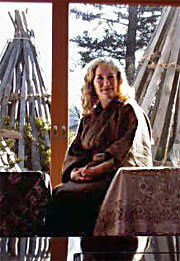
Musings and Poems
This page features poems and contemplation about Japan and your
experiences there or in relationship to all things Japanese.
We offer these pieces
for starters. Where will they take you ? Back somewhere on your
own journeys in Japan? Will it spark your reminiscences and writing
too? We invite your feedback, and your thoughts in response to
what is here.
And please send us pieces
you've written you'd like to publish on this page. Please send
them by email to hennagaijin@hennagaijin.org.
Me-Datsu-Mono • The
Natto Story • Leaving Japan • The
Hurt and the Healing • Thanksgiving 2002
• Japanese Oranges
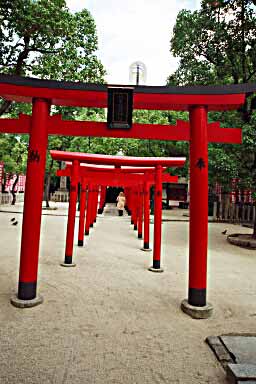 ME-DATSU-MONO ME-DATSU-MONO
(Eyes - stand up - thing,
i.e. Someone or something strikingly conspicuous)
I've always been a me-datsu-mono in Japan,
since I first came to Ni-hon (Japan)
when I was 19, with red hair sparkling down to my waist.
I pinned it up, and startled little old women
whose geta (wooden sandals) clattered up to mine
when they bowed and peeped under my ban-gasa (oiled paper
umbrella)
to say hello, and saw my green eyes.
I let it fly in the wind one day,
and children in Shikoku chased behind the Oni (demon),*
trying to pluck a hair.
When my looks and clothes aren't enough to draw attention,
my command of Japanese always does.
The night Akihiro and I went out in Tokyo in 1992,
all the men around us were envious of him,
speaking English so well with that pretty gaijin (foreigner).
I lost a gold bracelet to the back streets of Tokyo,
wandering with him that night.
"Do you remember that?” I asked, after I said
“Shou-shou o machi” (“Wait a moment”)
in Yamagata Station,
stopping to close the catch on the damascene bangle
my mother brought me from Spain for my 50th birthday.
Maybe this time my mother’s gold bracelet wanted to stay
in Yamagata,
I laugh to myself back home in Seattle, hanging up my well-traveled
jacket.
In the closet, I see the mink coat she gave me
when she moved to sunny Florida from cold St. Louis.
I can hardly ever wear it in Seattle’s mild winters.
It would keep me warm in Yamagata,
but I’ll be oh, so much more conspicuous!
*In Japanese folklore, demons have red hair.
-Maiyim Baron
April 2002
Me-Datsu-Mono • The
Natto Story • Leaving Japan • The
Hurt and the Healing • Thanksgiving 2002
• Japanese Oranges
"The
Natto Story", excepted from the novel Kuromai - Black Rice:
An Opening into Love between Cultures, a love story about natural
living and the conscious evolution of society,
by Meadow Wakefield.
It was another feast at the hot springs inn where we were staying
– a combination of “Western style breakfast” with
an egg frying before us on a Japanese style burner more often
devoted to traditional delicacies, plus the usual Japanese breakfast
foods like rice and miso soup. Including natto.
We sat at the low tables placed before us on the tatami, dressed
in the Japanese yukata and tanzen robes we'd hurriedly
put on when the maids sent us down for a morning soak so they
could pick up our futon and clear the room for breakfast.
This morning, Hiro served the rice, and then stirred his natto
(fermented, and therefore very smelly, soybeans) with relish,
and teased me about this one Japanese food I have not yet come
to like.
It’s always a test for gaijin: If we can eat with ohashi
(chopsticks), then it’s “Do you like sushi?”
If we love sushi, the questioner probes more deeply: “Well
then, can you eat sashimi?” If we answer yes
to that, the questioner, with some consternation, asks a harder
question: “Do you like natto?”
The nebari (stickiness) of his natto seemed to
increase as he stirred gleefully, although I’ve been told
the sliminess decreases as you whip in a dash of shoyu
(soy sauce) and the pile of sliced green onions usually served
with it. I know natto’s rank smell, and offered him my portion.
“Genki dashite, ne” “For your health,
to keep your strength up,” I said and would have winked,
if winks worked in Japanese flirtation.
“They sell natto at Uwajima-ya, you know. I’ll have
natto for you when you come to visit,” I promised.
“Natto is very good for your health,” he repeated,
as I’ve been told a hundred times. “You can start eating
natto with one or two beans, and increase day by day. Here,”
and he offered me his chopsticks with a fat pile of beans on them,
trailing yellow gooey strands a foot long back to his bowl. He
wound them up like spaghetti.
What was I supposed to do? In Japan, it is not polite to take
something directly from another's chopsticks, despite the scenes
of speed and dexterity shown in "The Karate Kid." And
besides, how could I possible grasp this pile of sticky beans?
“No, no that’s too much for me,” I protested.
He dropped half the beans back in his bowl.
“This much,” he again offered. Should I pick up my
bowl and let him put the natto on top of my rice? In a culture
where ojosan - pampered daughters carefully raised
to be good marriage material- are sent to finishing school to
learn how to eat so carefully with ohashi that they can
put a dainty bite directly into their mouths without touching
their lacquered lips, the etiquette around the proper use of chopsticks
and bowls can be complicated.
“No, no, still too much,” I shook my head. He put half
of what remained back into his bowl. The remaining few beans clung
to his chopsticks and when he put them neatly into my mouth I
happily tasted their odd flavor again.
“The most delicious natto I’ve ever had!” I declared.
Days later, in the midst of a theater performance, this scene
came back to haunt me, and I was astounded by the intimacy of
his action and the way I’d naturally received his offering.
At the time, I’d opened my mouth to receive the food he put
into it like a babe receiving from it’s mother, like a chick
from the momma bird, like one lover from the other, as if we’d
always been so close. Later, after I returned to Seattle, he’d
write: “I want to make our own tsukemono (pickles),
natto, o-miso, and maybe even tempeh, in the barrels
you found with me in the okura(old storehouse)."
Natto Story Part 2
We laugh at my friend's about natto, especially when I say I
miss it now, that I would eat it tomorrow for breakfast if it
was on my table. "There's worse things than natto,"
I laugh. "Believe me!"
After we went to the village soba (buckwheat) festival,
Mother and I came home, and Akihiro returned later, after helping
everyone clean up. He checked in with mother and the cat, changed
clothes, and we finally took our little walk to the Ji-zou-in
north of his house. It is a very old structure, but well-maintained
by the village people who love this shrine to unborn and vanished
children. And an ashtray suggested that perhaps the village young
men found it a conducive spot to meet and hang out. Hiro told
me again about the summer work party there which he'd mentioned
in email. We could still smell the scent of the freshly planed
Japanese cedar used in a new little prayer nook, taken from trees
felled in the surrounding grove when they moved the shrine.
We said our prayers, and tripping back down the stone steps towards
his house, Hiro said to me: "My mother said you talked with
the village folks like you had been friends for ten years. Your
gift for communication is really wonderful." If he was an
American man, he'd have slipped an arm around me and given me
a squeeze.
"Well, I just wanted to set them at ease, and let them feel
comfortable with me, you know," I said. "And thank you,
I feel very complimented." I held to a proper Confucian distance walking
down the stairs, and still felt the hug.
Much later in the evening, over a late supper, we returned to
talking over our notes from the natural farming talk we'd been
to the night before. "What did she mean when she was talking
about her old lady obaachan neighbors, and she used the
word 'Arai' ?" Iasked Hiro.
"I didn't catch that. 'Arai', huh? I don't understand
that word either," said Hiro.
"Arai?" Our conversation had caught Mother's
attention too. " 'Arai?' That's local dialect
for 'erai'."
"Erai? Is that it?" Hiro said. This is a word
that has often puzzled me; it's used to compliment both babies
and scholars, and interpreted in a variety of ways, from 'You're
great.’ Or ‘He’s famous and /or well educated too'
to 'You're the tops, the best, you take the cake.'
Our talk turned to joking and laughing over the day. Hiro had
been so busy working in the kitchen, he'd missed the soba-mochi, a gooey treat like soft dumplings made from soba flour, and served
with sliced green onions and natto. "Did you eat that too?"
Hiro asked me.
"Oh, yeah, it was good. Especially with all that natto
on it!" I laughed.
"Did you eat the natto too?"
"Oh, yes, thanks to you. It was unusually good natto,
wasn't it?" and I turned to mother for confirmation.
"Un da be. (So desu ne
in standard Japanese.) Yes it was,” she agreed.
"Erai desu," he repeated softly, facing
straight forward, but saying it to me. Meaning "You are great,
worthy of praise," or something like that. Lean legs in jeans
pushed back from the table, and he crossed his arms in his striped
sweater and turned to me. "Miriam-san wa arai na. Aria
da na." he said in dialect, with a sharp nod of approval
and an easy smile, the sparkle of pride in his eyes igniting a
flush that warmed me too.
Me-Datsu-Mono • The
Natto Story • Leaving Japan • The
Hurt and the Healing • Thanksgiving 2002
• Japanese Oranges
These two stories about Kobe after the terrible earthquake in
1998 are from long time Kobe resident Cece Frank. They were both
published in The Daily Yomiuri.
THE HURT AND THE HEALING
We thought it was the end of the world, and it was. My beautiful
city of Kobe lay whimpering and wounded. Once I overcame my initial
fright and my heart stopped trying to be a taiko drum, I knew
we were safe. My husband was holding me in his arms. The warmth
of his body against mine gave me the reassurance I sorely needed.
Scattered around us were our broken possessions. They weren't
important. We were alive, we had a roof over our heads and nothing
else mattered.
Later in the day every woman in my neighborhood was searching
the stores and bakeries for bread. I looked into the windows of
the bakeries, saw there was no bread and kept walking. In one
bakery the baker was filling cream puffs. That's what they had
and that's what they were selling. I went on to the network of
little street in my pursuit of a bakery with bread. On a small
side street there was an opened bakery. There was one other customer
in the shop. There were six rolls on a tray. There was nothing
on the shelves behind the counter. The lady looked at me and said
to the clerk, "Mittsu." She bought three and I bought
the remaining three. With a bow of my head I said, "Thank
you." I was not able to tell her that her kindness touched
my heart.
I had bread. The lack of water became my greatest worry. My husband
and I gathered three buckets and started walking toward the closest
school with the hope of finding someone who would be able tell
us where we should go. We were joined by a gentleman who asked
us inEnglish, "Where are you from, how long here"? He
was carrying a water can and the three of us teamed up. He told
us there was water at the nearby elementary school.
People were filling buckets from the swimming pool. He shouted,
"No, not pure water!" I looked and almost gagged. He
was right. I could not cook with or drink that water. We followed
the gentleman to a line across the school yard where people from
Kobe City Water Department were dispensing water from 40-gallon
plastic bottles. Even though they were limiting the amount given
to each family, by the time they reached us we received only half
a bucket. We wanted to share the water we had with the man who
had befriended us, but he would have none of it. We were told
the men from the Water Department would be back but they could
not say when. We would wait. Time is irrelevant and unimportant
when necessities are the prime concern. When the men returned
every family in the line received their allotted one 4-gallon
bucket of water. We stopped at the swimming pool to fill another
bucket. I reassured our friend it was for the toilet. We thanked
him for his consideration and help. We bowed our heads and he
returned the bow and walked away. I am still looking for him to
ask, "Are you and your family all right?"
In the evening we, like all our neighbors, were back in our houses,
collecting our thoughts and trying to bring some semblance of
order into our particular predicament. The door bell rang. On
the other side of the gate was one of our neighbor's young daughters.
In her outstretched hand she held a small package. A precious
gift, onigiri. My tears of gratitude added salt to the rice balls
as I quietly said my "Gochisosama deshita."
We have lived in our all-Japanese neighborhood in Tarumi for
over four years. Our inability to speak Japanese with our neighbors
had been a barrier to our developing an enriching relationship.
Our fault, not theirs.
Months later the wounds Suma suffered are still open. Caved in
roofs, broken and twisted homes and buildings have yet to be demolished
and cleared away. We have seen many homes leaning against each
other for support and maybe, comfort. The sorrow of abandonment
in juxtaposition with hope were two red and white futons draped
over the porch railing of a forsaken house. Some day they too,
will find their home.
The ragged, sharp edges of the days, weeks and months since the
life of Kobe changed have been slightly smoothed over and rounded
by our memory and the convalescing of the city.What was will never
be again, and I am filled with great sadness for people I don't
even know.
JANUARY 27, 1995 LOST AND FOUND
It has been 10 days since my Kobe - my city with a boulevard
called "Flower Road, with flowers growing the planters on
the sidewalks, with trees and more flowers in the center separating
the four lanes of traffic - was mutilated. The planters were twisted,
broken and most of the trees were bent and uprooted. My mind refused
to grasp the reality of what I saw. The collapsed buildings! Daimaru
Department store was a convoluted mass of concrete and steel.
Streets where once there had been swarming traffic were now impeded
by cracks and heaves of concrete.
Thoroughfares were limited to trucks inching along carrying relief
goods and dump trucks heaped high with the remains of buildings.
Until today what I saw on TV has been the like watching a Pierre
Boulez production of "Gotterdammerung" on an 8-inch
screen. What I was seeing was the gotterdammerung of an exuberant,
vivacious, and vibrant city. My beautiful Kobe was gone.
Five years ago, when I was a newcomer to Kobe, I was constantly
getting lost in the labyrinth of shopping streets and side streets
in the center of the city. Often I was uncertain. Was Daimaru
ahead of me or was Nankin-machi behind me? Too frequently, when
I was looking for a particular shop, I would go left when I should
have gone right or turn into a street when I should have walked
straight ahead. In my excursions to Kobe my starting point had
been Sannomiya Shrine. Each time I became lost, I would return
to the shrine like a homing pigeon to start again to find the
place I wanted. The shrine was my landmark. When I saw the stacked
barrels of sake to the side of the gate and the curved roof barely
visible over the stone fence, I knew where I was and I was no
longer lost.
On January 17, 1995 my landmark was lost. The plunging tiles
from the great roof crushed the sake barrels and the altar with
its offering to the Kami. Sannomiya Shrine lay on the ground like
an ancient wounded animal. The torii was rubble, and the stone
lanterns were rubble. Jagged, shattered roof tiles lay on the
ground as if scattered by a naughty giant. The royal purple curtain
with the emblem of the emperor at the entrance to the altar, proclaiming
to all the importance of this shrine, was ripped and hung mournfully
over one corner of the broken roof. I stood in front of the tilted
historic marker reading again the legend of Sannomiya Shrine.
On this spot over 100 years ago the "Kobe Incident"
occurred. On January 11, 1868 the leader of a procession of samurai
was so incensed by the rudeness of the a band of British sailors
to their lord they attacked the group. The apology came on February
9th,when the samurai leader committed suicide. As I was reading
this familiar legend I felt my hot tears flowing down my cold
cheeks. The battered shrine was the emblem of all I had seen in
past hours. Kobe did not commit suicide, but it was badly injured.
The Tyrannosaurus Rex of today are the cranes biting and chewing
at the once invincible concrete and steel buildings, expressways,
and bridges. The sounds coming from the wounded homes as these
modern animals tear into them are the screams of memories. "Chicken
Little" was right, the sky is falling. The sky has become
the blue plastic tarpaulin sheets protecting the contents of buildings
from the wind and rain that is sure to come.
I have looked for little, little things to allow me an occasional
sigh of relief from what I have seen and felt these past days.
NHK-Fm radio resumed its morning concerts and programs. In the
afternoon hours the announcer continued reading the names of the
dead and missing, and from what cities they were from. I reverted
to listening to my music tapes. A reading of names without faces
was too impersonal for me to comprehend. I saw the intense, sweet
face of my dead friend, the shattered Kobe, and it was too much.
The wind blows through my house rattling my windows. A truck
door is slammed, and my house shudders. These once, everyday sounds
bring back the anguish of those days when my world drastically
changed. I am learning January 1995 was not the end of Kobe. It
was a new beginning.
Me-Datsu-Mono • The
Natto Story • Leaving Japan • The
Hurt and the Healing • Thanksgiving 2002
• Japanese Oranges
Thanksgiving November, 2002
My altar looks perfect:
Multi-colored hand-woven silk kimono cord binds it all together.
But something is missing: Kuromai (black
rice) from this year’s harvest!
We could have marked the final bundle we all put together,
to draw on for special luck and strength.
En-musubi da na, binding our fates together.
But maybe it’s even more powerful,
mixed in anonymously amongst all the rest,
lending the power of us all to the harvests down through the years,
which continue sustaining us.
Which of this year’s grain will be seeds for the next?
Last year’s harvest is getting buried in the pile on my
altar plate
with its white swirl of the Universe left open in the black glaze.
This November I added Japanese cedar, and tsukushi
(horsetail) from Thornton Creek.
And the two wooden tops are resting quietly, gathering their winter
energies,
resting near Pan playing his flute (always!)
and Kannon-sama, the Goddess of Compassion.
I would I’d left the red silk kimono in Yamagata,
but lucky, as its red color indicates,
it wanted to make the trip to America at least once,
so John could drink in its deep color.
Three kamemushi horned beetles came along for the
ride too,
and blinked at me, before Kali and I drowned them.
John hasn’t seen the pattern of cranes woven into the red
silk.
I’ll show him later…before I send it back there.
Sunset beni-zome colors of orange and apricot in
the west,
Parrish bright blues and pinks to the east and all around us,
fading to lavender wisps like the pale autumn chrysanthemum flowers
we eat with this season.
The family chases after a hurricane of a sunset,
wanting to swim and dive in it.
Suddenly it flames below
and we shout and hoop drunkenly
turning crazily down streets to broaden our view.
I’m glad some nama-choco truffles climbed
into my bag too
as John and I enjoy a choco “Melty Kiss.”
Tomorrow I will heat up an inch of iron,
and hammer straight the place where the iron hook I made will
fasten
to the wall in the genkan entry way to hold that
round iron vase
we found in the okura storehouse this time.
The bitters and sweetness of our days…it’s ALL Good.
Me-Datsu-Mono • The
Natto Story • Leaving Japan • The
Hurt and the Healing • Thanksgiving 2002
• Japanese Oranges
Japanese Oranges – A Christmas 2002 Reminiscence for my
daughter
by Brent Gushowaty, Vancouver, B.C.
Japanese oranges were always part of Christmas for as long as
I’ve had Christmases. Sometimes you’d spot them first
in the Shop Easy, or maybe at your friend’s house when you
went over to play. Their arrival was the real beginning of that
warm, exciting squirmy feeling of the approach of Christmas. In
those years they came in slatted wooden boxes that had been nailed
together and you had to use a claw hammer to open the box. My
mother would invariably tell me to smell the boxes before we bought
them to avoid one containing a rotten orange. I remember that
the wood was different than any other wood you saw. It was Japanese
wood, light coloured and light weight.
Japanese oranges were so easy to peel and they were so much fun
to eat. My favourite method was to separate each little segment,
let them dry out on the cold Winnipeg winter windowsill and then
crack through the crispy skin with my teeth to release a chill,
sweet orange gush of flavour. Heaven.
But my best memory of Japanese oranges and Christmas is one that
still hovers in my memory, timeless in a way I can’t wholly
explain. It would have been the last Saturday before that particular
Christmas, perhaps four or five days before the Big Day. One of
the my father’s community service groups, the Kinsmen’s
fund raisers was the sale of Japanese oranges. Phone lists were
made and called to get orders and then your boxes were delivered
right to your door by the Kinsmen. I must have been about ten
years old when this happened. Whether I pestered my Dad about
it or it was offered out of the blue I can’t remember but
somehow I got to go on the truck that day. It was the best thing
I could possibly imagine at that age. Everything about it was
exciting. Being allowed to go meant I had passed some point in
Growing Up that, though invisible to me, was judged to be right
and appropriate by my family and the society of men.
In the back of the truck were three hundred and fifty boxes of
Japanese oranges. Three hundred and fifty! I loved going from
house to house, seeing all the different backyards (we delivered
from the back lane) and all the different people I had never seen
and what they said and how one of the Kinsman would take the money
and make change from his big brown leather mitt. I felt important,
useful and not so much a kid I suppose. It was, all of it, deliriously
wonderful. We braced ourselves against the wall of the truck as
we bounced over the uneven snow and turned corners. When it was
my turn (not often enough!) I would walk through the backyard
snow to hand someone a box of oranges. The ground was well covered
with snow by that time of course and it was a brilliantly sunny
Winnipeg winter day. The light was absolutely incandescent and
in my memory it surrounds us with a white perfect glow. So for
most of a day I rode happily in the back of the white panel truck
with a few other boys, and some of the Kinsmen. I was learning
and listening and alive.
I will never forget how I felt that day, so purely, simply joyful.
And in one of my imaginings of an ending, when all my days have
been embraced, I might simply return to that day of Winnipeg snow,
white light and Japanese oranges to remain.
Me-Datsu-Mono • The
Natto Story • Leaving Japan • The
Hurt and the Healing • Thanksgiving 2002
• Japanese Oranges
From the Mountains to the Sea - Leaving Japan
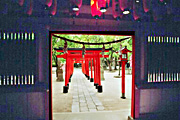 Standing
impatiently at the ticket office in the station, reserving my
seats on the Shinkansen and the Narita Express to the airport,
I was anxious for the first time since I'd arrived there. The
few minutes left till the ten o'clock train's departure were ticking
away. Standing
impatiently at the ticket office in the station, reserving my
seats on the Shinkansen and the Narita Express to the airport,
I was anxious for the first time since I'd arrived there. The
few minutes left till the ten o'clock train's departure were ticking
away.
"Am I going to make that train?"
"Daijoubu, don't worry, it'll be alright," both Hiro
and the fellow inputting the data for my ticket replied together.
I figured they both know this system and where I have to go to
get the train better than I do, and relaxed a bit, but as soon
as Hiro had the tickets in hand, he dashed with them and my big
suitcase towards the train, and I scuttled behind him with the
rest of my luggage.
He picked up my heavy bag easily and hoisted it swiftly down
all those stairs to where the train was waiting, the loudspeaker
already announcing its departure and that the doors were about
to close. Ahead of me, he loaded my bag into the open space between
the cars, and I jumped on with the rest. No time for tearful goodbyes
full of uncertainty this time - and not much uncertainty to be
tearful about. I looked at him standing on the platform, framed
by the door about to close, and remembered how I'd impetuously
leaned out last time to give him one last kiss - on the mouth
- enough to make him cringe with embarrassment if there had been
anyone who noticed.
I did it again. And this time he didn't seem surprised by it.
Maybe he even knew it was coming and wanted it.
We bowed and waved our goodbyes as the train started, and in
a second or two the train was out of the station and gathering
speed. I found my seat and settled in, ready to light up a cigarette
with the rest of the guys on the train and just sit and be, comfortably.
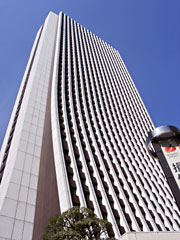 Towns
it had taken us an hour or so by car to reach slowed into view
and sped away again every ten minutes or so, as the train made
its few stops before picking up speed for its first longer leg
to Fukuoka, before going on to Tokyo. The cool and cultured voice
on the PA system announced "Ladies and Gentlemen, we will
soon make a brief stop at…" as we came and went. A tinkly
Japanese little girl voice touted the refreshment sellers making
their way through the cars. I looked up at the young lady dressed
like a candy striper passing down the aisle and said right away
in Japanese "Some natural water please," before she
had time to cower over having to serve a gaijin. I took the bottle
she gave me along with the coffee I ordered, and later realized
I had recognized the characters for "Natural Spring Water"
without looking, as I took the square clear plastic bottle from
her. Not like when I had stood befuddled for quite a while three
weeks ago before making a sure selection from the lines of beverages
in clear bottles the first time I'd faced three vending machines
full of drinks in the streets of Kobe. Towns
it had taken us an hour or so by car to reach slowed into view
and sped away again every ten minutes or so, as the train made
its few stops before picking up speed for its first longer leg
to Fukuoka, before going on to Tokyo. The cool and cultured voice
on the PA system announced "Ladies and Gentlemen, we will
soon make a brief stop at…" as we came and went. A tinkly
Japanese little girl voice touted the refreshment sellers making
their way through the cars. I looked up at the young lady dressed
like a candy striper passing down the aisle and said right away
in Japanese "Some natural water please," before she
had time to cower over having to serve a gaijin. I took the bottle
she gave me along with the coffee I ordered, and later realized
I had recognized the characters for "Natural Spring Water"
without looking, as I took the square clear plastic bottle from
her. Not like when I had stood befuddled for quite a while three
weeks ago before making a sure selection from the lines of beverages
in clear bottles the first time I'd faced three vending machines
full of drinks in the streets of Kobe.
I wrote a last thank you letter to Hiro on the train, the Japanese
script coming easily, though my penmanship wavered with the train's
swaying, and I had to go back and make a number of corrections,
and check on some words I haven't had occasion to use before,
like the one for "a lovers' meeting."
I finished writing just as we emerged from the first really
long tunnel, and looking up at the scenery, it was obvious we
were no longer in the Mountain Country. The fall trees still held
their multi-colored foliage there. It wasn't much longer till
we were in the outskirts of Tokyo, and then I recognized Ueno,
one of the hearts of the older Tokyo. Then the "mansions"
started filling the view - those rows of enormous high-rise apartments
so euphemistically named in Japan, and any single family houses
were few and far between.
Tokyo is surely one of the man-made wonders of the modern world.
It is stunningly huge - both sprawling and dense. It is a clamoring,
sparkling wonder -a vast monument to materialism. The throngs
of people in Tokyo station all look rather chic, sharply dressed
compared to the more casually, warmly dressed folks in the North.
But I find their uniformity in black or other severe and subdued
colors subtly disturbing and no where do I see the easy, genuinely
friendly smiles I met in the countryside.
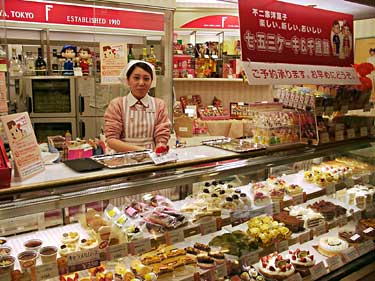 I
can't pass through Tokyo station, even with my piles of luggage,
without stopping for some of Devi's favorite cakes, "Hi-yo-Ko"
which she's enjoyed every trip to Japan I've made since she went
there herself the first time, when she was four. We call them
"Little Chickies" for their adorable shape, and the
sweet pale yellow bean paste inside them which suggests an egg
yolk. I also have to pick up some red bean paste filled "nin-gyou
yaki" too, those little cakes that take their elaborate shapes
from the tight iron forms they are grilled in, which mark them
with the lines of the latest popular anime character, Doraemon.
I hang them and the lunchbox I choose dangling from the front
of my already overburdened bags. I
can't pass through Tokyo station, even with my piles of luggage,
without stopping for some of Devi's favorite cakes, "Hi-yo-Ko"
which she's enjoyed every trip to Japan I've made since she went
there herself the first time, when she was four. We call them
"Little Chickies" for their adorable shape, and the
sweet pale yellow bean paste inside them which suggests an egg
yolk. I also have to pick up some red bean paste filled "nin-gyou
yaki" too, those little cakes that take their elaborate shapes
from the tight iron forms they are grilled in, which mark them
with the lines of the latest popular anime character, Doraemon.
I hang them and the lunchbox I choose dangling from the front
of my already overburdened bags.
I pick a grilled eel
over rice packaged lunch, thinking I'll enjoy one last treat of
a Japanese delicacy I haven't otherwise eaten much of this trip.
After several treks up and down the platform, I determine where
my assigned car on the Narita Express train will board, and join
the queue. Trains come and go every few minutes, and I am absentmindedly
looking at the train before me as I stand in line, when the announcement
on the loud speaker suddenly gets through to me and I realize
this is the train I want, and the other people standing there
must be waiting for the next one. I bolt aboard and barely bump
my heavy bag onto the train before the door hisses shut.
From my seat on one of the best trains in the world, I am appalled
by the miles of drab sameness and the unending blocks of overcrowded
apartments. Recalling the lost looking people I'd seen in the
pachinko parlours in Shinjuku, I can't understand why they live
there. I guess it's a "tolerable situation," not yet
one they feel is intolerable, but surely there must be options
for them. They could choose an easier, healthier lifestyle, but
they don't seem to be able to see the options before them.
I concentrate on the
grilled eel eki-ben, which lacks more than the good company I'd
enjoyed at meals to make it more than cold and unexciting. I reflect
on the meals at Hiro's house: simple, and not much different from
day to day, because whatever vegetables are at hand show up on
the table everyday in different forms, along with many kinds of
tofu, and a few animal products. The vegetables are all what the
neighbors trade amongst themselves. Those who grow daikon radishes
share them in abundance with those who don't, and the next day
perhaps a neighbor who's just harvested hakusai cabbages trundles
around with a load of them in his wheelbarrow and drops them off
on the radish grower's stoop in a simple exchange, returning the
favor of the goodness that's easily harvested from the ground
by those who attend to her ways.
My attention suddenly
perks up and I look out - we are passing through rice fields again
as we near Narita. I know I'll never see rice fields the same
way again, now that I've gotten my own feet stuck in that rich
mud.
It's taken only four
hours to journey from the Mountain Country to Narita International
Airport on the edge of the Pacific. How soon can I make the journey
back again?
Excepted
from: An Opening into Love by Meadow
Wakefield.
Me-Datsu-Mono • The
Natto Story • Leaving Japan • The
Hurt and the Healing • Thanksgiving 2002
• Japanese Oranges
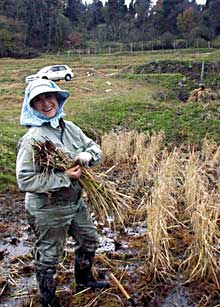 Look
back here for more stories to come. Look
back here for more stories to come.
Also, if you would like us to post your Henna Gaijin story send
it to us at HennaGaijin@HennaGaijin.org
|







